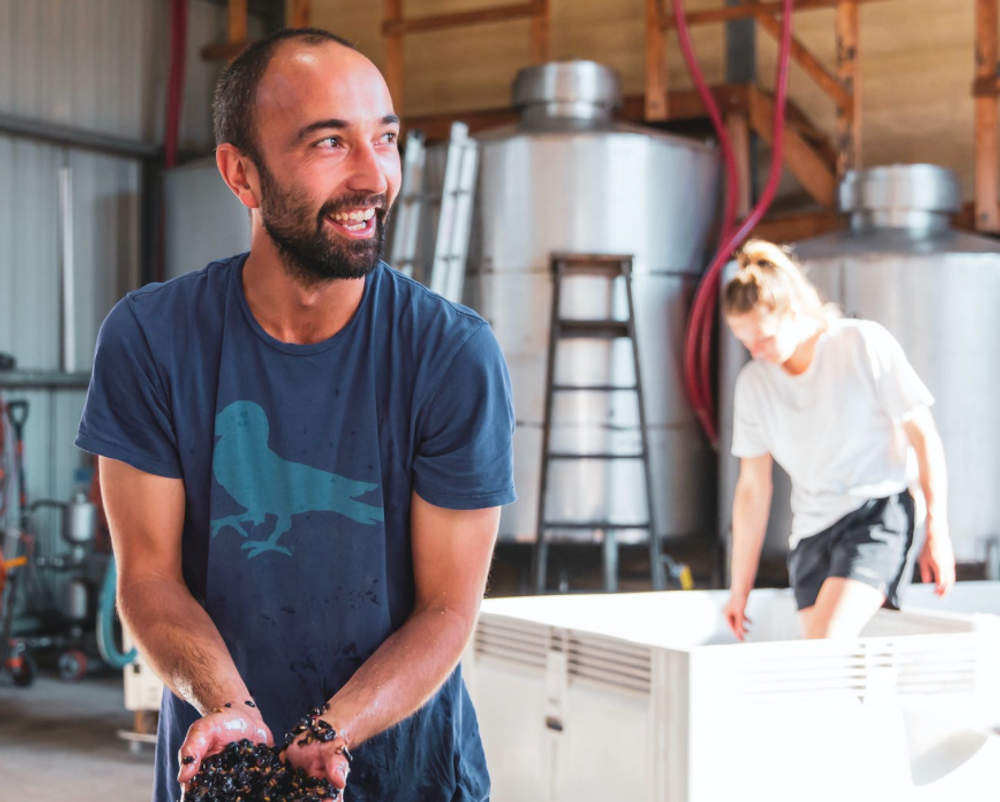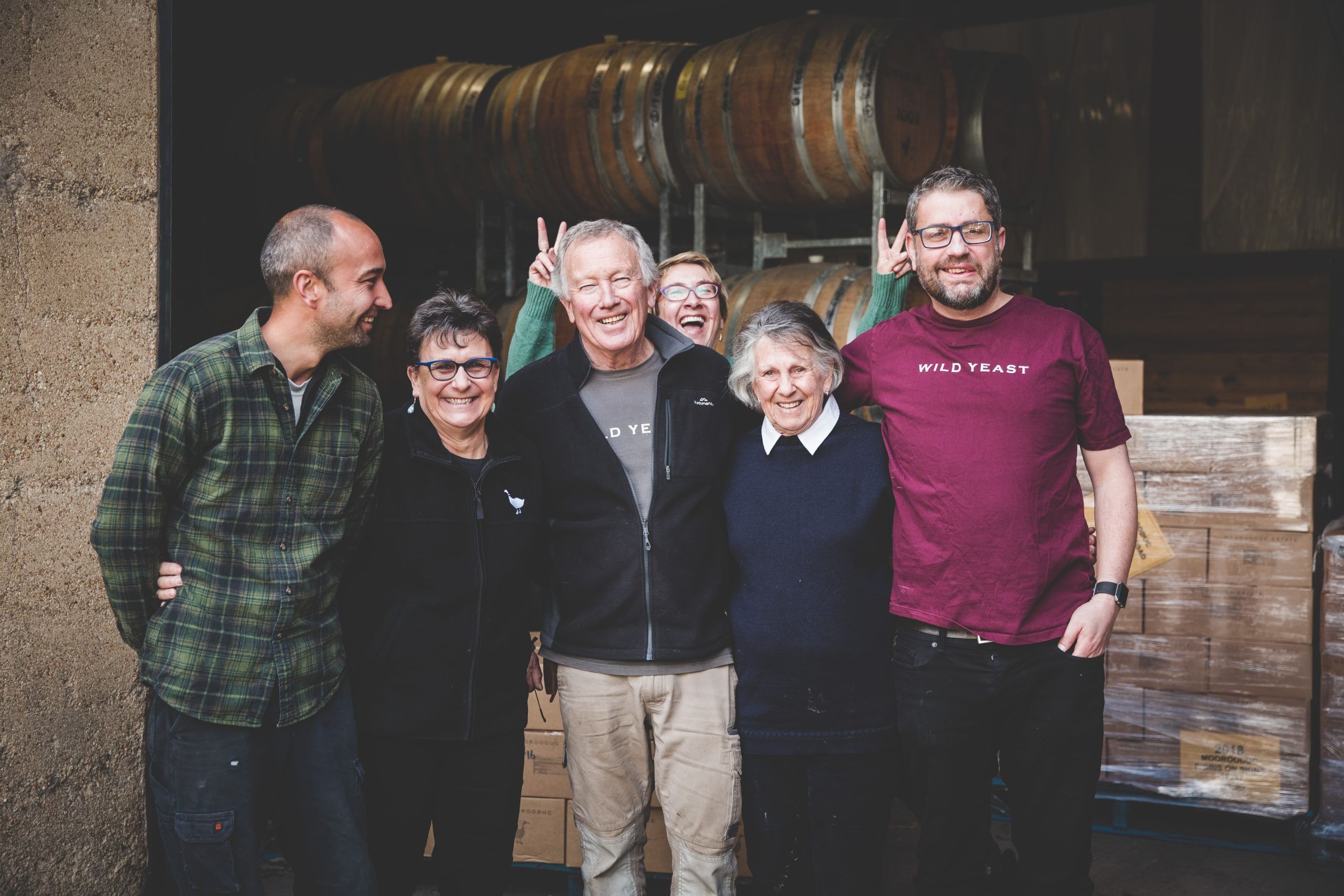Tell us about the winery and your winemaking philosophy?
At Moorooduc Estate we have a simple desire – to grow beautiful fruit as close to home as possible and not muck it up in the winery. We are small, and want to stay that way. Both because we believe that attention to detail is important, and we are also control freaks!
We are a three person team in the winery at Moorooduc – me (MW), my father Richard (self-taught winemaker and mad scientist) and Jeremy, who has a winemaking and viticulture degree.
We share a philosophy of trying to grow the best fruit we can in the vineyard and use gentle, hands on winemaking to let the character of the variety and the vineyard to shine through. We are fascinated by regenerative viticulture and have been applying these principals gradually in the vineyard over the past few years. The soil is looking regenerated, and we think it is a lovely way to farm.

Regenerative viticulture is now an important part of how Moorooduc make the wines they want to make
In the winery, we keep things simple. A little sulphur at fruit reception, and then we rely on wild yeast for our primary ferments. We like to let the wine breathe, so post ferment the wines are left in fully topped barrels with no sulphur additions for eight to 10 months and all the wines go through a spontaneous MLF during that time. We check the barrels about once a month and apart from that we leave them to do their thing, until it’s time to get them ready for the bottle.
Then all the wines get a little sulphur, the whites are filtered (in case of any remaining malic acid) and the red usually fall clear naturally, so no need for filtration. We taste barrels together a number of times to ascertain which are to go to the single vineyard wines, and which are destined for the Estate wines
We rarely disagree about what goes where – the vineyards and vintages tell their stories pretty fluently and it’s our job as winemakers to help them to be heard.
Has that changed over the years and if so how?
Not hugely but I think we have polished and refined our philosophy, and we trust more in our accumulated wisdom today. I would say we have become more assured in the way we choose to make wine rather than just following the status quo.
When Moorooduc started in 1982, it was dad’s dream to make a bit of wine and transition from a career in surgery to a career as a grape grower and winemaker. He has taught himself on the job and has always had a top-quality product in mind. His original aspired role of winemaker has evolved into a custodian of the land with a desire to lead by example: in how he farms grapes, aiming to grow the best fruit possible and to improve the quality of the soil and the site while doing it.
Over the years he has trialled winemaking originally seen as risky in Australia and now trendy – things like wild ferments, natural MLF, whole bunch fermentation of Pinot Noir (but not for everything) and Shiraz.He is a true scientist and is always happiest experimenting.
Today the focus is ever more on the vineyard - there is more experimentation with combinations of seeds for cover crops, worm juice and weed teas and techniques to grow happier vines in healthier soils.
How would you describe the wines you want to make?

Moorooduc's winemakers Richard McIntyre and Jeremy Magyar
Wines that are delicious to drink.Wines that inspire a little awe, wonder and joy. Wines that taste good on their own but better with food, that you can enjoy young but that will reward the patience of time in the cellar. Wines that are worth getting to know better. We want to make wines that are true to the best their variety can achieve and that speak of a sense of a special place - so much so that they inspire the drinker to want to know more about Moorooduc the place as well as the wines.
What does the Mornington Peninsula give you that you can't get in other wine regions?
Australia is a big hot continent, with lots of uninhabitable desert in the centre. All of the best wine regions in the country cling close to the edges of the continent, but the Mornington Peninsula is particularly special because it is a peninsula, surrounded on three sides by water that comes straight from the cold Southern Ocean and Antarctica, and winds that when they blow from the south, the east or the west, travel over this cold water before they come to us. These winds cool and humidify the air in summer in a way that is unique to our region .A patchwork of small sites, almost exclusively small family businesses who make wine with passion and pride and very little big company interference also adds to the unique qualities and specialness of the Mornington Peninsula.
What are your current biggest goals and targets in terms of driving the business forward?
We want to continue to do better, rather than get bigger. Keep making and selling our wines of quality while improving our environment. We would like to achieve a zero carbon footprint and are working towards this with investments in solar panels, electric vehicles, batteries etc. We want to get livestock in the vineyards (at least during winter while the vines are dormant) to continue to advance our regenerative viticulture practice. This requires more infrastructure. One day we would love to buy more land, but we are working hard to retain our lease holdings in an increasingly competitive world.
What have been the biggest challenges in recent years and how have you got over them? What have you learnt most from those difficult experiences?
Currently we don’t have enough wine, particularly Chardonnay, as Mother Nature has been a little fickle over the past few years. We have learned to ration what we have, prices have had to go up, but slowly, and the most important thing we have learned is how to manage expectations and to say no to new markets.
Looking after loyal customers is really essential to our business model. Fortunately but perhaps most frustratingly, the quality of the wines continues to improve.
What have been your biggest achievements and proudest moments and how has that helped the winery and yourself move forward?
On a personal note attaining my MW is still my proudest moment but the fact that it lead me back to Moorooduc and that my qualification continues to open doors in business opportunities as well as informing how we relate to the rest of the wine world continues to help the business and how we move on.
Working to take my parents dream into the next generation is very inspiring to me as well.
In terms of your range - what developments have you looked to introduce/ in terms of style and quality?
We are always tinkering, thinking, tasting and talking. The Pinot Gris on Skins was an experimental wine in 2015-2017 that has become an important part of the portfolio. Our Chardonnays and Pinots Noir are pretty classic and as the quality of the fruit continues to improve from vine age and viticultural practices we are making little adjustments in the winery with regards to new oak (less, larger format) but really it’s about keeping all the parcels separate and tasting them regularly to see how they are evolving and to decide what has the potential to go where.
What are your biggest export markets and where would you like to sell more wine if you could?

Our main market is Australia but the UK is our biggest export market. We sell a little wine in the US which is fun, but also hard work. We have dipped our toe in the Asian market and would love to get back into Japan as we love an excuse to visit that country. We don’t need to conquer the world and we love it when people come looking for us.
The UK is special for us – we have great distributors, we have had some terrific reviews of our wines from the UK press (including Matthew Jukes, Sarah Ahmed, Brad Horne (@winetimelondon),Kate Hawkings, Margaret Rand, to name but a few).
Working with the delightful team at Spritz Marketing in recent years has help to consolidate and organise my chaotic approach to communication.
How do you see the UK market vs the rest of the world in terms of attractiveness and competitiveness.
As far as export markets go the UK is very attractive to us – we make classic, high-quality wines that the UK market appreciates and can relate to.
We have a unique relationship in the UK with our importers and distributors, Vindependents. They represent us beautifully, understand our philosophy and the members are very supportive and individual.
I visit the UK every year to support them in the trade and as a group of independent retailers that span the length and breadth of the UK, this gives me a unique opportunity to spend time with these people who love to drink and sell our wines and their customers all across Britain.
Every time I visit, I make some new friends, and catch up with old friends of Moorooduc. It’s very rewarding.
Where would you like to see the winery and business get to in the next five to 10 years - what are your mid to long term goals?
Vines get older, soil gets better, we get wiser, wines keep getting more exciting. I would like my 78 year old father who started all this 42 years ago to stay healthy and fit to see what happens over the next 10 years too.
* You can find out more about Moorooduc Estate at its website here.






























